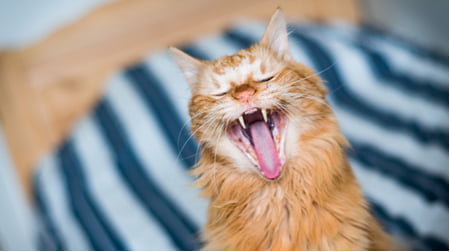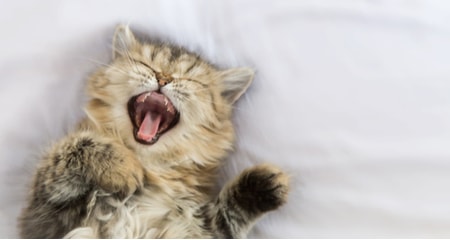
Cats use yawns to express themselves, this type of body language can mean they are stressed, but it can also mean:
- Tiredness
- Boredom
- To Stay Awake
- Low Oxygen Levels
- To Display Dominance
- Socialization
- Contagious Yawns
- Mouth Pain
- Response to Stretching
Cats are one of the most common household pets – over 25% of homes in the United States have one living under their roof, but how much do we really know about our cat’s body language?
Having been a cat mom for all of my life, my favorite thing about cats is that you can experience new things with each one. Some cats enjoy belly rubs, while others only want a pat on the head.
While their individual personalities may be different for every feline, their body language stays consistent.
To better understand your cat and why they might display certain behaviors, it’s important to get to know their body language – and that starts with one of the most common things: a yawn!
1. Stress Can Easily Affect Your Cat’s Behavior and Body Language Such as by Them Yawning
Cats are a very adaptable species, which means that they can adjust their lifestyle to almost any environment. Despite this, cats are also creatures of habit, and changes in their lives can cause stress. These changes include things like:
- Introducing a new animal
- Moving to a new location
- Trips to the veterinarian
- A power struggle between multiple cats
- Temporary or permanent changes in a home such as moving furniture or hosting a party
Yawning can be a sign that your cat is experiencing stress. This may also be accompanied by other stress-related symptoms such as:
- Freezing in place
- Hiding
- Licking their lips
- Excessive grooming
- Twitching whiskers
- Hissing

You can reduce your cat’s stress by keeping major changes in its life minimal. If you notice that your cat is experiencing symptoms of stress, you can:
- Provide your cat with a place where they feel safe and can get away from potentially stressful factors
- Keep its space clean with fresh water and food
- Offer treats and positive reinforcement as your cat works through whatever is causing their stress
- Use a gentle, calm approach when talking to and touching your cat
- When your cat is feeling up to it, bond with it by increasing playtime and daily interaction
It’s important to never punish your cat verbally or physically and instead encourage positive behaviors through positive actions.
If your cat is additionally displaying symptoms of fear or aggression, avoid interacting with it until it has calmed down enough to allow you to help it work through his/her stress.
2. Just Like Humans, Cats Also Yawn When They Feel Tired

For you and me, yawning is universally known as a symptom of being tired – and it can also mean the same thing for a cat.
According to Animal Planet, cats sleep “anywhere from 16 to 20 hours a day”. This is because felines have a predatory nature and have to save up energy to hunt in the wild.
While your domestic house cat might not have to hunt for food, those instincts still exist inside of it.
Daily interaction and other stimulation are important for your cat to be able to expel this energy in a positive way, such as by playing with toys or using a scratching post.
Your cat might also benefit from interactive treat dispensers or a special feeding bowl that require it to tap into its hunting instinct. If you find that your cat is always awake, utilizing these tools might help them get rid of all of that pent-up energy so that it can get a good night’s rest.
3. If Your Cat Has Nothing to Do, They Might Yawn Due to Boredom

To go together with feeling tired, cats also yawn when they’re bored.
While cats might seem like a lazy species, they require daily interaction and stimulation. This might include:
- Playing with toys
- Having access to a scratching post or cat tree
- Spending time with other cats or animals
- Enjoying your company
If your cat is in an environment without many things to enjoy or seems to be feeling less enthusiastic than normal, try offering a variety of different toys to play with, such as::
- Crinkle balls
- Catnip-infused toys
- Kickers
- Interactive treat dispensers
Places for your cat to call its own, such as:
- Cat trees
- Empty boxes
- Window perches
- Elevated shelves
- Scratching posts
- Another cat
- Extended daily play time
- More interaction with yo
4. Cats Don’t Always Want to Sleep – Sometimes They Yawn to Stay Awake Too

While a cat’s yawn may indicate feeling tired, that doesn’t mean that your kitty is ready to go to sleep.
In fact, a cat might use yawning to keep themselves awake instead. So how does this work?
When your cat yawns, it triggers a signal that alerts its brain to wake up. This is the same reaction that happens for humans, which is why we find ourselves yawning more frequently the sleepier we are.
While cats sleep often, they are also very curious creatures and there are many reasons they might want to stay awake, such as:
- To play with you or other cats
- Waiting for a meal or treats
- Needing to use the litter box
- Feeling uncertain about surroundings and adjusting to a new location
- Feeling threatened by another animal, loud noises, etc.
If your cat appears not to be sleeping enough due to a factor of stress, anxiety, or fear, you can help eliminate the cause of these feelings by providing your cat with a space where they feel safe enough to rest.
5. Your Cat May Yawn Just to Take in More Air
Just like humans, cats need oxygen to survive. Sometimes, the brain doesn’t get enough oxygen, which means that there is too much carbon dioxide in the animal’s body.
When this happens, a yawn is a perfect response so that their bodies can get access to a large amount of air and balance out its levels of oxygen and CO2. But when and why does this happen?
The most common cause of yawning to access more oxygen is due to slowed breathing, such as when feeling tired or fatigued. When you’re sleepy, your breathing slows down drastically, which can result in less oxygen reaching the brain and trigger a yawn.
It’s important to observe your cat closely if they are frequently yawning, as low oxygen levels can also be the result of an underlying health issue. If you suspect that your cat is unwell, contact a veterinarian immediately.
6. Feeling Threatened or Territorial? Your Cat Might Yawn to Display Dominance

Felines are predators whether they’re living domestically in our homes or out in the wild.
In the wild, larger felines like lions, tigers, and panthers often yawn to show off their sharp teeth to other predators and prey. By doing this, they are displaying dominance and showing that they are strong and capable animals.
This behavior has been passed down to domestic housecats as well. If there’s a new cat in the neighborhood or you’ve recently introduced a new animal, you may observe your cat yawning more frequently to show who’s boss.
7. Cats Might Use Yawning as a Form of Socialization, Though It’s Just a Theory
While it hasn’t been proven, there are scientific theories that yawning in cats can be linked to a form of socialization.
Just like other behavioral patterns and types of body language, cats might try to interact with you or other cats by yawning.
So, what exactly is your cat trying to say?
While cats can communicate vocally through meows, hissing, chirps, and other sounds, a yawn is a much more peaceful type of communication. By releasing a yawn, the cat is not only soothing itself, but also letting other cats know that he/she has good intentions.
8. Could Your Cat Be Catching a Yawn From You? Science Says That Yawns Are Contagious

Have you ever noticed that when one person yawns, sometimes it starts a chain reaction of yawning across the room?
That’s because yawning can be caused by an emotional reaction, such as due to stress, and this can cause other people to react in response as well.
While this is most common in humans, science has proven that primates, dogs, and even cats are also capable of yawning back at a human or another animal, which means your cat’s yawn might be contagious.
It’s important to note that, while it’s possible for a cat to respond to your yawn with one of their own, it’s not as common as a person yawning because of another person.
This is because yawning in response to another yawn is triggered by an emotional response, and cats are less likely to respond this way if it’s not something that they’re feeling directly.
9. If Your Cat Is Yawning Excessively, They Could Be Experiencing Oral Pain

Due to their status as predators, cats are known for being excellent at hiding when they experience pain. Because of this, it’s not always easy to know when something is wrong with your cat.
A sign of pain or irritation to the mouth or face might be displayed by various symptoms, including yawning. Other symptoms may include:
- Difficulty eating or drinking
- Drooling
- Sleeping more than usual
- Hissing
- Frequent vocalization
- Face twitching
- Pawing at their mouth and face
Since we don’t always get a good look at the inside of our cat’s mouths, it can be difficult to determine if your cat is having an issue. While they might not always vocalize this pain, excessive yawning can be a symptom of something bigger going on.
If you suspect that your cat is experiencing mouth pain, it’s important to contact your vet immediately.
10. Your Cat’s Automatic Response When Stretching Is Also to Release a Yawn

As we talked about, cats are notoriously sleepy animals. Their schedules can vary greatly, and if they’re not playing or eating, they’re usually asleep.
Just like you or me, a cat can sleep very deeply, and this can result in some grogginess when they first wake up. In order to help the body to get moving, your cat may stretch out its muscles and simultaneously yawn, which is known as pandiculation.
Pandiculation is the body’s way of recognizing muscle tension after a good nap, which encourages it to respond by creating more tension and releasing it all at once. This contraction relaxes all of the muscles in the body, making it easier for you to get up and go.
For cats, this response is often automatic after they’ve rested, so it’s a very common behavior that most cats experience multiple times a day.
Sources
http://www.animalplanet.com/pets/normal-sleep-time-for-a-cat/
https://www.jaxhumane.org/wp-content/uploads/2016/03/How-to-Understand-Cat-Body-Language.pdf
https://www.softpaws.com/causes-signs-and-treatment-of-stress-in-cats/
https://www.ovenbakedtradition.com/en/cat-language/
https://www.thenakedscientists.com/articles/questions/can-you-catch-yawn-cat
https://www.avma.org/resources-tools/reports-statistics/us-pet-ownership-statistics
https://www.merckvetmanual.com/cat-owners/digestive-disorders-of-cats/disorders-of-the-mouth-in-cats
https://www.okawvetclinic.com/why-cats-hide-pain.pml
http://www.rmtedu.com/blog/pandiculation
https://www.psychologytoday.com/us/blog/sleep-newzzz/201009/what-s-in-yawn
http://www.vetstreet.com/cats/why-does-my-cat-yawn-so-much
https://www.catbehaviorassociates.com/15-boredom-busting-tips-for-your-home-alone-cat/